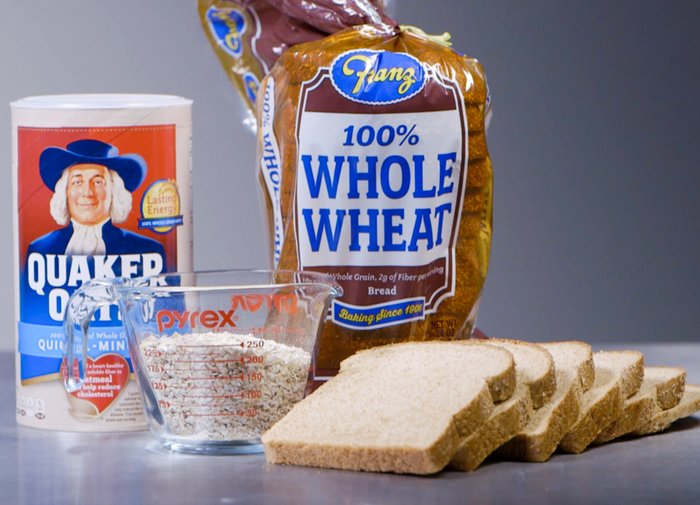The phrase "carbs for fat loss" may seem like an oxymoron. The truth is, it isn't. In fact, in the last decade or so, numerous scientific reviews and research studies have shown that moderate-carb diets are equally effective for fat loss when compared to low- or very-low-carb diets, in both the short term and long term.[1-4]
The upshot of these studies is that the diet you can follow consistently is the one that will give you the best results. And for most of us, a balance of macronutrients, not just a reduction in carbs, is what will make us feel our best and provide the fewest struggles.
Here's why carbs still deserve your consideration, and how to get the most out of them when you're trying to lose weight.
Reason 1: Carbs Help You Keep Your Hormones in Check
Fats often get associated with healthy hormone levels, but carbs can help here as well! Carbs boost levels of the appetite-suppressing hormone leptin at a rate far greater than fat.[5]
Here's how it works: The longer you restrict calories, and the more weight you lose, the further your leptin levels decline.[6] This decrease in leptin can intensify hunger signals, making fat loss—and sticking to your diet—much harder. Just a few weeks of dieting can have a significant impact on leptin levels, but fortunately, it only takes 12-24 hours of overfeeding, particularly with carbs, to return leptin to normal levels.[7] This is why I am such a huge advocate of weekly "refeeds"—high-carb days slightly above maintenance-caloric needs.

Before you get too excited about all those extra calories and order Dominos, realize that an extra-large pizza usually doesn't count as a refeed, and may actually work against you. A high-fat meal affects fat storage to a greater degree than a high-carbohydrate meal, because ingested fat is more readily converted for storage versus ingested carbohydrates. Additionally, a high-fat meal has been demonstrated to promote a dip in leptin levels for up to 24 hours [8]
The hormonal benefits of carbohydrates don't end with leptin, though. Carbs also suppress cortisol, a hormone that, if chronically elevated, can cause loss of muscle mass, increased abdominal fat storage, inflammation, water retention, decreased output of the thyroid hormones, reduced metabolic rate, decreased production of testosterone and estrogen, and higher perceived stress levels.
Reason 2: Carbs Prevent Muscle Loss
Having carbs pre-workout can help prevent muscle loss by providing an alternate fuel source to muscle protein. When dietary carbohydrate levels are very low and glycogen stores are depleted, your metabolism turns to fat and amino acids, both from dietary protein and from your own muscle, to fuel moderate-high-intensity activities including HIIT training, circuit training, and heavy weight lifting.
Training while glycogen-depleted, as with a low-carb diet, has been shown to cause increased levels of protein degradation along with decreased rates of protein synthesis in the muscle, neither of which is favorable for maintenance of lean mass, let alone muscle growth.[9]
Aside from replenishing glycogen levels, carbohydrates make it possible to train at higher intensities and for longer periods of time, which means more calories burned. Carbohydrates also act as "high octane" fuel, allowing you push more weight and eke out more reps for any given exercise, which translates to greater stress to the muscle fibers and more pronounced gains. And, of course, the more calories you burn, the easier it is to shed fat!
Reason 3: Carbs Are Where You Get Fiber
Protein and fats have a lot going for them, of course. But fiber always has, and always will, be the domain of carbs. And fiber is a key nutrient for fat loss.
Dietary fiber comes in two forms: soluble fiber and insoluble fiber. Foods rich in soluble fiber have been shown to have positive effects on weight loss and weight maintenance due to their ability to increase feelings of satiety and fullness. They can also help decrease insulin levels, which can decrease overall food intake, since insulin stimulates appetite.[10]

Insoluble fiber has its own role in fat loss. This fiber adds "bulk" to foods, allowing you to feel fuller on fewer calories and avoid that feeling of hunger 5 minutes after you've cleaned your plate. Insoluble fiber also helps food move through your digestive system, promoting regularity and helping prevent constipation.[11]
There is also evidence that getting adequate dietary fiber helps reduce visceral fat surrounding the organs. Why is this important? Visceral fat is strongly associated with metabolic syndrome, type 2 diabetes, and obesity.[12]
Reason 4: Many Carbs Are Nutrient-Rich
Despite all of the wonderful benefits of carbohydrates and fiber, you should expect to curtail your carb intake somewhat with any calorie-restricted fat-loss diet, since you can only cut protein and fats so far without impacting key biological functions.
When this happens, it's time to emphasize high-fiber, high-nutrient carbohydrates in order to hit the recommended 20-40 grams of fiber per day, as well as the many crucial micronutrient markers you should aim to hit daily for health and performance.
The following carbohydrate sources pack the most fiber per calorie, are nutrient-dense, and are good choices for fat loss, particularly when you have to cut back on other carb sources:[13]
- Vegetables such as dark leafy greens, artichokes, cauliflower, eggplant, onions, lettuce, cabbage, summer squash, winter squash, green beans, broccoli, asparagus, Brussels sprouts, green beans, turnips, sweet potatoes, and white potatoes (with skin)
- Whole grains such as oat bran, rice bran, wheat bran, oatmeal, quinoa, and bulgur
- Beans such as including black, kidney, lima, and navy
- Lentils and peas, especially chickpeas, green peas, and split peas
- Fruits, especially berries, pears (with skin), apricots, oranges, apples, grapefruit, mangoes, and passion-fruit
Reason 5: Calories Matter More Than Carbs for Fat Loss
I probably should address the high-glycemic versus low-glycemic debate. Some would argue that high-glycemic carbs have no place in a fat-loss diet due to their "insulin-spiking" effect that reduces insulin sensitivity and causes carbs to be stored as fat. Research on this topic is contradictory at best, though.[14-16]
Rather than worry about "high-glycemic" versus "low-glycemic," "slow carbs" versus "fast carbs," or whether or not your carbs are "starchy" or "complex," I recommend emphasizing carbs that are rich in nutrients and fiber.

What's important to understand is that, regardless of the restrictions you place on your carbohydrate intake, fat loss isn't possible unless you're eating fewer calories than you burn. You've probably heard it before, and the science still holds true: Caloric deficit is the chief requirement for fat loss.
If you're looking to burn fat, you can't go wrong with figuring out your maintenance-calorie needs, subtracting 20-30 percent of total calories for fat loss, and then determining how much protein and fat your body needs. Then, use carbohydrates to fill your remaining energy needs.
Don't Just Eat Your Carbs: Enjoy Them
There's another idea I want to contest: Namely, that you have to eat only "clean," nutrient-dense foods to lose fat. You can still enjoy your favorite foods regularly without hindering your progress! Just make sure 80-90 percent of your diet is made up of nutrient-dense foods that aid fat loss.
Divvy up that other 10-20 percent however you'd like. Maybe it means topping your protein pancakes with a scoop of ice cream, pairing your salad with a handful of chips, or using your entire meal as a "treat." As long as you limit your indulgences to fewer than 20 percent of your overall calories, you'll set yourself up for success. Remember, the best fat-loss diet is a sustainable one!
References
- Foster, G. D., Wyatt, H. R., Hill, J. O., McGuckin, B. G., Brill, C., Mohammed, B. S., ... & Klein, S. (2003). A randomized trial of a low-carbohydrate diet for obesity. New England Journal of Medicine, 348(21), 2082-2090.
- Sacks, F. M., Bray, G. A., Carey, V. J., Smith, S. R., Ryan, D. H., Anton, S. D., ... & Leboff, M. S. (2009). Comparison of weight-loss diets with different compositions of fat, protein, and carbohydrates. New England Journal of Medicine, 360(9), 859-873.
- Naude, C. E., Schoonees, A., Senekal, M., Young, T., Garner, P., & Volmink, J. (2014). Low carbohydrate versus isoenergetic balanced diets for reducing weight and cardiovascular risk: a systematic review and meta-analysis. PLoS One, 9(7), e100652.
- Nordmann, A. J., Nordmann, A., Briel, M., Keller, U., Yancy, W. S., Brehm, B. J., & Bucher, H. C. (2006). Effects of low-carbohydrate vs low-fat diets on weight loss and cardiovascular risk factors: a meta-analysis of randomized controlled trials. Archives of Internal Medicine, 166(3), 285-293.
- Dirlewanger, M., Di Vetta, V., Guenat, E., Battilana, P., Seematter, G., Schneiter, P., ... & Tappy, L. (2000). Effects of short-term carbohydrate or fat overfeeding on energy expenditure and plasma leptin concentrations in healthy female subjects. International Journal of Obesity, 24(11), 1413-1418.
- Weigle, D. S., Duell, P. B., Connor, W. E., Steiner, R. A., Soules, M. R., & Kuijper, J. L. (1997). Effect of Fasting, Refeeding, and Dietary Fat Restriction on Plasma Leptin Levels 1. The Journal of Clinical Endocrinology & Metabolism, 82(2), 561-565.
- Kolaczynski, J. W., Ohannesian, J. P., Considine, R. V., Marco, C. C., & Caro, J. F. (1996). Response of leptin to short-term and prolonged overfeeding in humans. The Journal of Clinical Endocrinology & Metabolism, 81(11), 4162-4165.
- Izadi, V., Saraf-Bank, S., & Azadbakht, L. (2014). Dietary intakes and leptin concentrations. ARYA Atheroscler, 10(5), 266-272.
- Howarth, K. R., Phillips, S. M., MacDonald, M. J., Richards, D., Moreau, N. A., & Gibala, M. 10. J. (2010). Effect of glycogen availability on human skeletal muscle protein turnover during exercise and recovery. Journal of Applied Physiology, 109(2), 431-438.
- Anderson, J. W. (1990). Dietary fiber and human health. HortScience, 25(12), 1488-1495.
- "Fiber." The Nutrition Source. Harvard School of Public Health, n.d. Web. 29 July 2016.
- Hairston, K. G., Vitolins, M. Z., Norris, J. M., Anderson, A. M., Hanley, A. J., & Wagenknecht, L. E. (2012). Lifestyle factors and 5‐year abdominal fat accumulation in a minority cohort: the IRAS family study. Obesity, 20(2), 421-427.
- "Search Results." Foods Highest in Dietary Fiber. SELF Nutrition Data, n.d. Web. 29 July 2016.
- Sacks, F. M., Carey, V. J., Anderson, C. A., Miller, E. R., Copeland, T., Charleston, J., ... & White, K. (2014). Effects of high vs low glycemic index of dietary carbohydrate on cardiovascular disease risk factors and insulin sensitivity: the OmniCarb randomized clinical trial. Jama, 312(23), 2531-2541.
- Karl, J. P., Roberts, S. B., Schaefer, E. J., Gleason, J. A., Fuss, P., Rasmussen, H., ... & Das, S. K. (2015). Effects of carbohydrate quantity and glycemic index on resting metabolic rate and body composition during weight loss. Obesity, 23(11), 2190-2198.
- Juanola-Falgarona, M., Salas-Salvadó, J., Ibarrola-Jurado, N., Rabassa-Soler, A., Díaz-López, A., Guasch-Ferré, M., ... & Bulló, M. (2014). Effect of the glycemic index of the diet on weight loss, modulation of satiety, inflammation, and other metabolic risk factors: a randomized controlled trial. The American Journal of Clinical Nutrition, 100(1), 27-35.

